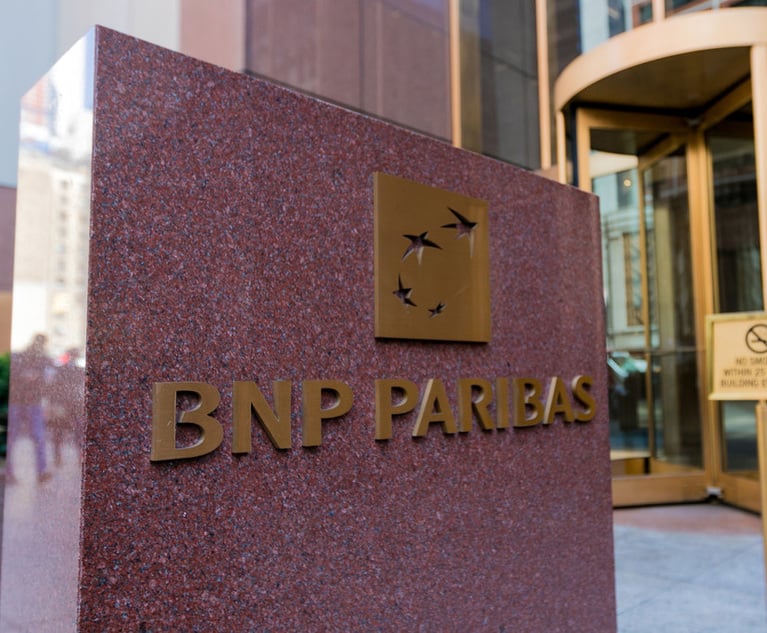Cyber Regulatory Enforcement Actions and Implications for Insurance Coverage
An enforcement action brought by the New York Department of Financial Services against First American Title Insurance Company alleging that the company breached the DFS's cyber regulations raises significant questions regarding whether the targets of such actions are afforded insurance coverage, and in particular, whether affording such coverage would be consistent with New York public policy.
November 04, 2020 at 11:30 AM
8 minute read
 On July 22, 2020, the New York Department of Financial Services (DFS), announced that it had commenced a regulatory enforcement action against First American Title Insurance Company (First American), which according to the DFS, is the second largest title insurance provider in the United States. In the action, DFS alleges that First American violated the DFS's Cybersecurity Requirements for Financial Services Companies (or the "Cybersecurity Regulation"), which first took effect on March 1, 2017, and generally requires, among other things, all entities regulated by the DFS, such as banks and insurance companies, to adopt a cybersecurity program to protect consumers' private information. Specifically, DFS alleges that First American exposed hundreds of millions of documents over the course of several years as a result of a vulnerability in First American's information systems, which may have exposed documents containing consumers' private information, including bank account numbers, mortgage and tax records, Social Security numbers, and drivers' license images.
On July 22, 2020, the New York Department of Financial Services (DFS), announced that it had commenced a regulatory enforcement action against First American Title Insurance Company (First American), which according to the DFS, is the second largest title insurance provider in the United States. In the action, DFS alleges that First American violated the DFS's Cybersecurity Requirements for Financial Services Companies (or the "Cybersecurity Regulation"), which first took effect on March 1, 2017, and generally requires, among other things, all entities regulated by the DFS, such as banks and insurance companies, to adopt a cybersecurity program to protect consumers' private information. Specifically, DFS alleges that First American exposed hundreds of millions of documents over the course of several years as a result of a vulnerability in First American's information systems, which may have exposed documents containing consumers' private information, including bank account numbers, mortgage and tax records, Social Security numbers, and drivers' license images.
The DFS's enforcement action is noteworthy for several reasons. It is the first such action commenced under the Cybersecurity Regulation. Additionally, the manner in which the private information was allegedly exposed is noteworthy, as the exposure was not due to an outside hacker compromising First American's cybersecurity protections, but rather, because of a purported flaw in a web-based document delivery system which allowed anyone to gain unauthorized access to private information. Further, the number of documents allegedly exposed in this manner is, in the words of the DFS's complaint, "staggering"—more than 850 million documents were accessible according to the DFS.
This article will discuss the requirements of the DFS's Cybersecurity Regulation, as well as the allegations at issue in the enforcement action against First American. This article will also discuss the penalties that the DFS is seeking against First American and the statute which imposes such penalties. Finally, this article will also discuss the implications of the enforcement action (and any similar future actions) on insurance coverage.
This content has been archived. It is available through our partners, LexisNexis® and Bloomberg Law.
To view this content, please continue to their sites.
Not a Lexis Subscriber?
Subscribe Now
Not a Bloomberg Law Subscriber?
Subscribe Now
NOT FOR REPRINT
© 2025 ALM Global, LLC, All Rights Reserved. Request academic re-use from www.copyright.com. All other uses, submit a request to [email protected]. For more information visit Asset & Logo Licensing.
You Might Like
View All
The CFPB Is Digging In for Last Days of Biden's Term. But What Happens Next?
6 minute read

NY AG James Targets Crypto Fraud Which Allegedly Ensnared Victims With Fake Jobs
4 minute read
'Merciless' Filing Deadline Dooms Cuban Americans' Property-Trafficking Suit Against BNP Paribas, SocGen
4 minute readLaw Firms Mentioned
Trending Stories
Who Got The Work
J. Brugh Lower of Gibbons has entered an appearance for industrial equipment supplier Devco Corporation in a pending trademark infringement lawsuit. The suit, accusing the defendant of selling knock-off Graco products, was filed Dec. 18 in New Jersey District Court by Rivkin Radler on behalf of Graco Inc. and Graco Minnesota. The case, assigned to U.S. District Judge Zahid N. Quraishi, is 3:24-cv-11294, Graco Inc. et al v. Devco Corporation.
Who Got The Work
Rebecca Maller-Stein and Kent A. Yalowitz of Arnold & Porter Kaye Scholer have entered their appearances for Hanaco Venture Capital and its executives, Lior Prosor and David Frankel, in a pending securities lawsuit. The action, filed on Dec. 24 in New York Southern District Court by Zell, Aron & Co. on behalf of Goldeneye Advisors, accuses the defendants of negligently and fraudulently managing the plaintiff's $1 million investment. The case, assigned to U.S. District Judge Vernon S. Broderick, is 1:24-cv-09918, Goldeneye Advisors, LLC v. Hanaco Venture Capital, Ltd. et al.
Who Got The Work
Attorneys from A&O Shearman has stepped in as defense counsel for Toronto-Dominion Bank and other defendants in a pending securities class action. The suit, filed Dec. 11 in New York Southern District Court by Bleichmar Fonti & Auld, accuses the defendants of concealing the bank's 'pervasive' deficiencies in regards to its compliance with the Bank Secrecy Act and the quality of its anti-money laundering controls. The case, assigned to U.S. District Judge Arun Subramanian, is 1:24-cv-09445, Gonzalez v. The Toronto-Dominion Bank et al.
Who Got The Work
Crown Castle International, a Pennsylvania company providing shared communications infrastructure, has turned to Luke D. Wolf of Gordon Rees Scully Mansukhani to fend off a pending breach-of-contract lawsuit. The court action, filed Nov. 25 in Michigan Eastern District Court by Hooper Hathaway PC on behalf of The Town Residences LLC, accuses Crown Castle of failing to transfer approximately $30,000 in utility payments from T-Mobile in breach of a roof-top lease and assignment agreement. The case, assigned to U.S. District Judge Susan K. Declercq, is 2:24-cv-13131, The Town Residences LLC v. T-Mobile US, Inc. et al.
Who Got The Work
Wilfred P. Coronato and Daniel M. Schwartz of McCarter & English have stepped in as defense counsel to Electrolux Home Products Inc. in a pending product liability lawsuit. The court action, filed Nov. 26 in New York Eastern District Court by Poulos Lopiccolo PC and Nagel Rice LLP on behalf of David Stern, alleges that the defendant's refrigerators’ drawers and shelving repeatedly break and fall apart within months after purchase. The case, assigned to U.S. District Judge Joan M. Azrack, is 2:24-cv-08204, Stern v. Electrolux Home Products, Inc.
Featured Firms
Law Offices of Gary Martin Hays & Associates, P.C.
(470) 294-1674
Law Offices of Mark E. Salomone
(857) 444-6468
Smith & Hassler
(713) 739-1250






